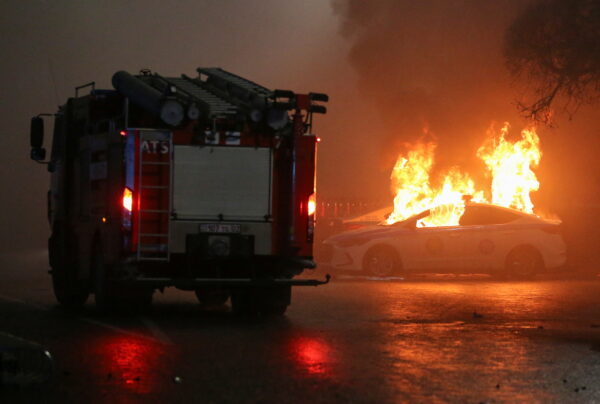The Russian-backed Collective Security Treaty Organisation (CSTO) has agreed to send in military forces to Kazakhstan to combat what has been called a “terrorist threat” after thousands of Kazakhs across the country continued to protest despite the resignation of the current sitting government.
Kazakh President Kassym-Jomart Tokayev called on the Russian-aligned bloc of former soviet countries for international support after demonstrators continued to protest the continuing dominance of former President Nursultan Nazarbayev over the country.
Tokayev said in his request for aid that military assistance was necessary to help Kazakhstan overcome a “terrorist threat.” In a televised address, the president has vowed that he will remain in the Kazakh capital, Nur Sultan.
“As head of state … I intend to act as robustly as possible,” Tokayev said. “Whatever happens, I will remain in the capital. It is my constitutional duty to be with the people.”
The chairman of the CSTO Security council, Armenian Prime Minister Nikol Pashinyan, has agreed to the request.
Pashinyan said in a post on Facebook that “in view of the threat to national security and the sovereignty of the Republic of Kazakhstan” from outside interference, the CSTO would be sending Collective peacekeeping forces to the Republic of Kazakhstan to “normalize the situation in this country.”
This is the first time the organization will deploy peacekeepers to intervene in the region’s political environment.
Currently, Russian military watchers have noted that Russian forces are said to be gathering in Moscow en route for deployment in Kazakhstan. The Almaty police service in Kazakhstan’s former capital also announced in a statement that they will be conducting an operation to secure law and order, reported TASS.
“A special counter-terror operation has been launched in the city to establish order,” the statement said. “Their attack on Kazakhstan is an act of aggression and an attempt to disrupt the state’s integrity.”
Residents of the city have been asked to remain “calm and render assistance to the law-enforcement agencies in establishing the Constitutional order and public security” against what the statement termed as “bandits.”
However, Kazakhs have been taking to social media to show protestors continuing to rally around the nation, with many chanting “Old Man Go” in reference to Nazarbayev. Protestors in Almaty, which remains Kazakhstan largest city, have also clashed with armed security forces, stormed government buildings, and set the presidential palace, the Ak Orda, on fire, reported The Associated Press.
In other parts of the country, protestors have posted images on Twitter of pulled down statues of Nazarbayev, and clashed with police and military forces.
Further, as support for the Tokayev government wains, police and military, in places like Aktobe in the west of Kazakhstan, are refusing to attack protestors. At the same time, in other areas, there have been reports of security forces surrendering to protestors.
This is despite a widespread internet and mobile phone blackout across the country, reports Russian media group TASS.
Confirmed: Kazakhstan is again in the midst of a nation-scale internet blackout as of early morning Thursday. While service was available, President Tokayev gave a televised speech appealing to Russia for assistance to “protect the state.” https://t.co/QRrm2LMTji via @netblocks pic.twitter.com/0bo1AQkKaI
— Liveuamap (@Liveuamap) January 5, 2022
Nazarbayev stepped down as president in March 2019 after thirty years as the leader but has continued to maintain control over the ruling party Nur Otan until Dec. 2, 2021. His children feature prominently in both Nur Otan and the government.
The protests, which started on Jan. 2 in the west of the country in the city of Zhanaozen and the Mangistau region, began in response to an increase in the price of fuel to 120 tenge (27 cents), from last year’s 60 tenge (14 cents).
Kazakh petroleum prices had previously been regulated and subsidized in the country. However, in 2019, the government decided to institute a move to an electronic pricing system to end subsidies for domestic liquefied petroleum gas (LPG) customers and allow the market to dictate prices instead.
This means that the domestic trade in LPG now happens over online trading platforms, and in areas where LPG fuel is in high demand—such as the Mangistau region, where the government estimated that at least 70 percent of cars run on the fuel—there have been steep jumps in prices.
However, the Kazakh government denies that the new pricing system is to blame for fuel prices and has pointed to retailers as the source of the steep price rise.
Energy Minister Magzum Mirzagaliyev said in a statement on Jan. 2 that there’s nothing wrong with the new system and that it’s the fault of gas stations, which he said had purchased LPG fuel for 78 tenge (18 cents) per liter but were setting the retail price between 100 to 120 tenge, at a 25 to 50 percent markup.

Mirzagaliyev said this was “higher than expected” and “gives us grounds to suspect possible price speculation among filling stations,” Eurasianet reported. He also said the price increases were due to increased demand for LPG, despite a stagnant output from the region’s gas company, while noting that the national anti-monopoly agency is investigating.
News of the resignations came after a state of emergency was declared in the Mangistau and Almaty regions until Jan. 22, after thousands of people demonstrated across Kazakhstan for a third day over the rising cost of LPG. A rally in Almaty drew at least 5,000 people, according to AFP, and protests around the country are growing.
President Kassym-Jomart Tokayev had called on Jan. 4 for protesters to abstain from causing more unrest in both a televised address and on Twitter. He also announced that “in order to ensure stability in the country,” the government had decided to reduce the price for LPG in the Mangistau region to 50 tenge (11 cents) per liter.
However, his comments have done little to quell the discontent, with Kazakhs taking to social media to post videos of the protests around the country.
From The Epoch Times
